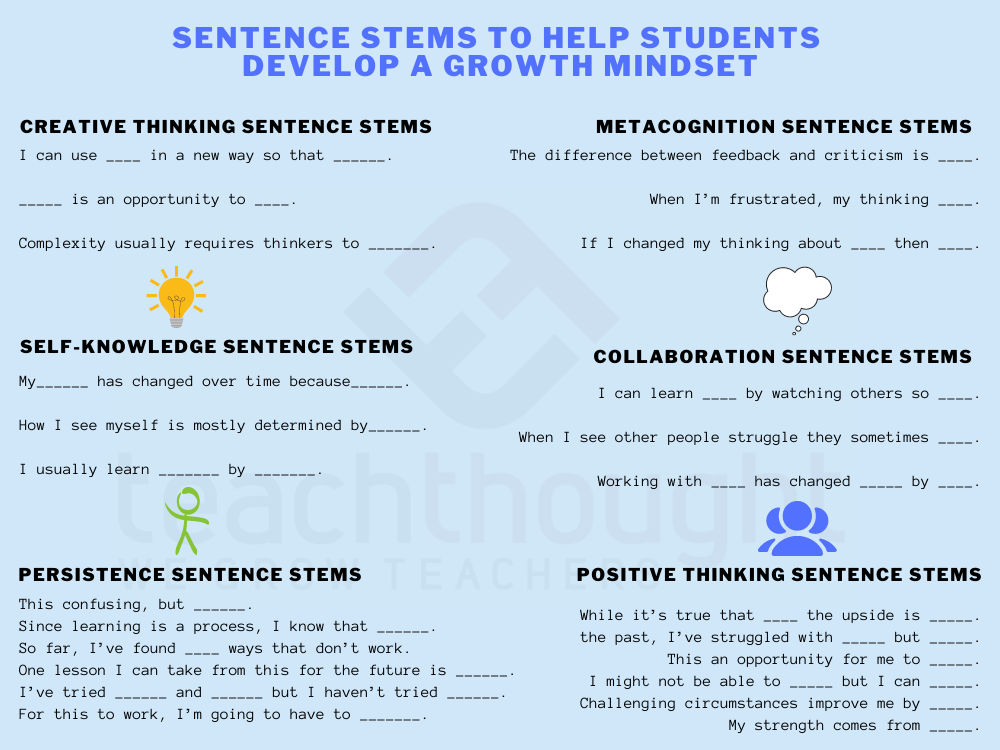How Can Sentence Stems Help Children Develop A Growth Mindset?
by Terry Heick
I’m a passionate proponent of sentence stems.
The biggest benefit of using sentence stems is the way it models the language, tone, and cognitive patterns native to certain activities. If you ask a student to summarize the plot of a story, there are many tasks embedded in that request, from recalling, analyzing, and distilling the story, to articulating it in a way that satisfies both their understanding of the story as well as any specific requests from you.
By offering a sentence stem–in this case, something like, ‘The plot is mostly about ______.’ You can then follow up with, “The plot is mostly about _______ but the real lesson is ______,’ or ‘The most important scene is _______ because _______’, etc.
(That is also somewhat how strategies like ‘Somebody Wanted But So’ works–as a kind of template for students to ‘fill in,’ which itself functions similarly to multiple-choice questions compared to essay or open response, for example.)
In 26 Sentence Stems For Higher-Level Conversation In The Classroom, I offered ways to scaffold critical discussions. Below, I offer something similar but to help students develop a growth mindset–and mindsets related to it.
See also 25 Ways To Promote A Growth Mindset In Students
Creative Thinking Sentence Stems
I can use________ in a new way so that________.
_____ is an opportunity to use ______.
One pattern I notice about problem-solving is________.
Complexity usually requires thinkers to _______.
Self-Knowledge Sentence Stems
When I see other people struggle and/or fail, I think________.
My________ has changed over time because________.
How I see myself is mostly determined by________.
I usually learn _______ by _______.
I most successful when I________.
I know this is my best because________.
This is worth doing or knowing to me personally because ________.
Working with others affects my learning by ______.
Group work can be great but when ______ I prefer _______.
Persistence Sentence Stems
‘Effort’ is its own kind of ‘smart’ because ________.
This confusing, but _______.
Since learning is a process rather than a single event, I know that________.
So far I’ve found ____ ways that don’t work.
The last time I faced a challenge like this, I _______.
When I’m confused, I usually________ but I also could consider _____.
I can’t let this stop me because _______.
I haven’t tried _______.
If I start over at the beginning, it might ______ but also could ______.
Here is a list of all of the people who haven’t failed (again and again): _______. [Obviously rhetorical. : )]
One lesson I can take from this for the future is ________.
I’ve tried _______ and _______, but I haven’t tried _______.
For this to work, I’m going to have to _______.
Reflection & Metacognition Sentence Stems
The difference between feedback and criticism is _______.
When I’m frustrated, my thinking _______.
If I changed my thinking about _______ then _______.
While I _______, I noticed that I _______.
When I approach situations like this, I tend to ______.
The personality trait of mine that tends to be most useful to me when I am challenged is ________.
Collaboration Sentence Stems
I can learn ________ by watching others which can help me because _______.
When I see other people struggle with something like this, they sometimes________.
Working with ______ has changed _______ by ________.
By working with ______, I night be able to _______.
Without collaborating with ______, I would not have been able to _______.
I need others when _______ because ________.
Positive Thinking Sentence Stems
While it’s true that _______, the upside is that _______.
In the past, I’ve struggled with _______ but _______.
This an opportunity for me to _______.
I might not be able to _______ but I can _______.
Challenging circumstances improve me by _______.
My strength comes from _______.
The last time something like this happened and I was hurt, worried, or confused, it turned out that ________.
I know things are going to turn out okay because _______.
Things didn’t turn out the way I hoped this time, but next time _______.
Feeling sorry for myself helps me by _______. (Ironic/sarcastic–obviously use in the right circumstance).

